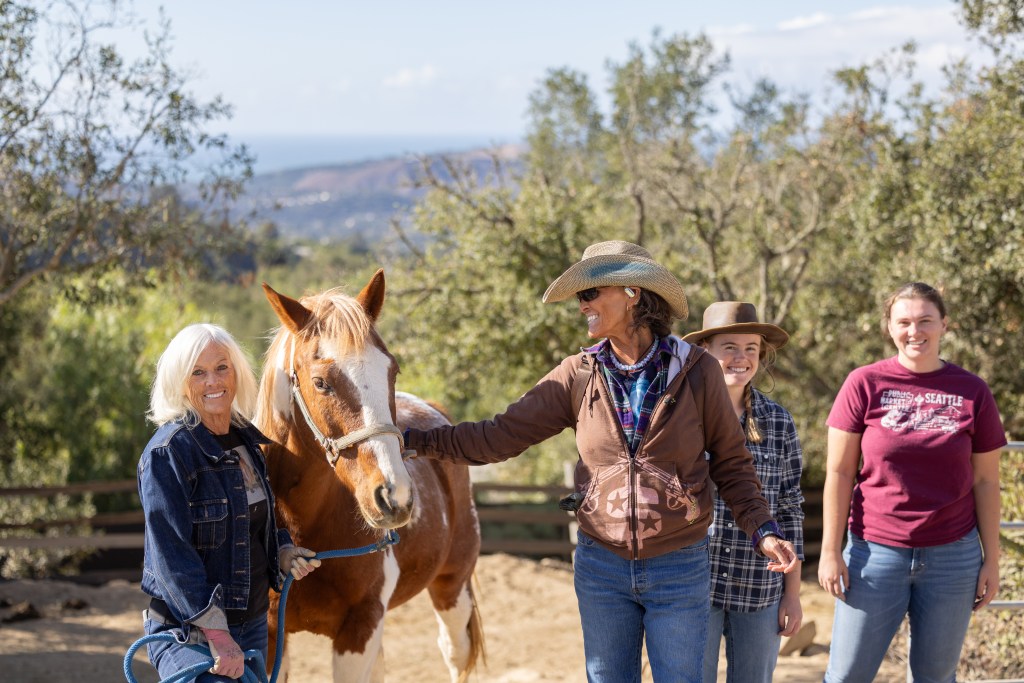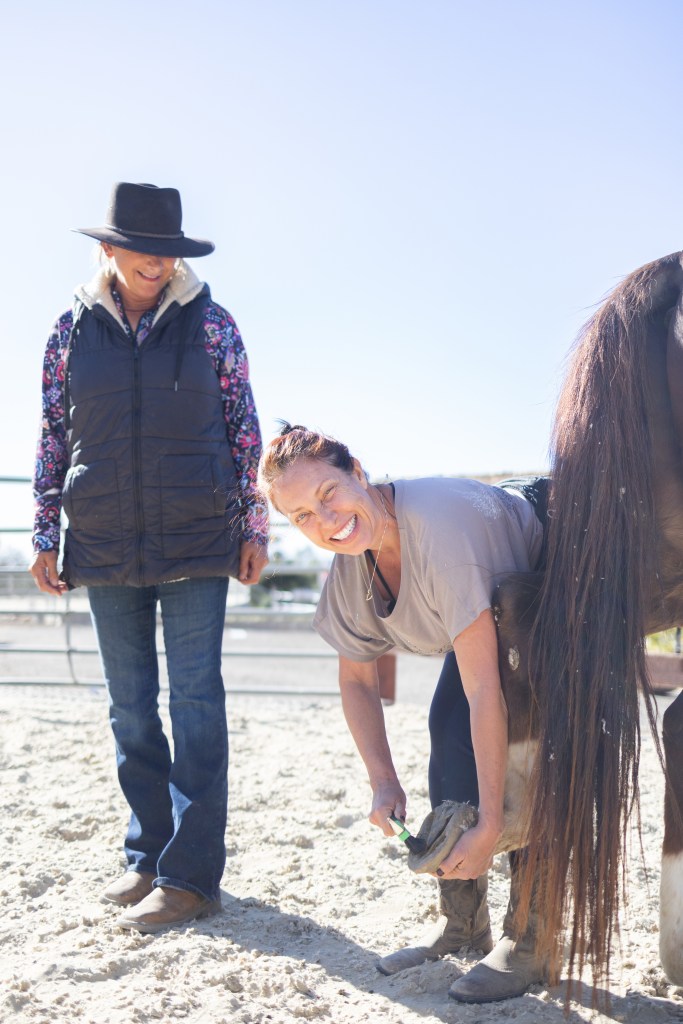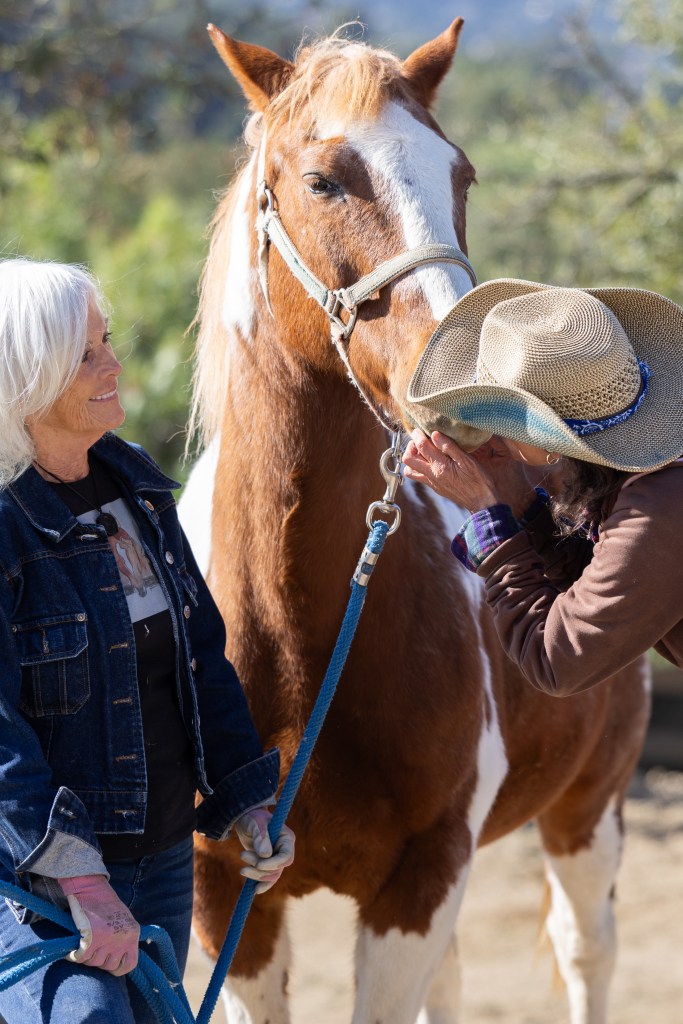Not Horsing Around
People Really Are Better with Horses,
Finds The Horse Project Santa Barbara
By Andrea Weir Estrada | Photos by Ingrid Bostrom
December 12, 2024

Their tagline says it all: “People Helping Horses. Horses Helping People” — a human-equine win-win.
And that’s the philosophy behind The Horse Project (THP) Santa Barbara. For more than a decade, the Santa Barbara–based nonprofit organization has devoted itself to bettering the lives of abandoned, abused, and neglected horses. Through the organization’s rehabilitation, retraining, and rehoming efforts, these rescued animals find new accommodations that match their individual needs, talents, and potential. Those considered unadoptable spend their lives in comfort and safety, among their own horse pals, at THP’s sanctuary.
And now, through a new and novel equine therapeutic program, the horses are returning the favor. As the stars of THP’s Better with Horses, they are rescuing humans and providing their own form of rehabilitation and retraining.
“Horses have an amazing ability to teach us, to heal us, and not just bring awareness but help us change,” said THP project leader Linda Kiefer. “And they’re so generous in allowing us to figure it out. They accept us as we are, without judgment. And the horses we’re working with in our Better with Horses program enjoy it. It’s stimulating and it’s fulfilling for them as well. So, it’s a great combination.”
Most recently, Better with Horses teamed with Blind Fitness, another Santa Barbara–based nonprofit organization that provides opportunities for people who are blind or have low vision to participate in physical and recreational activities.

Over a period of eight weeks, four individuals associated with Blind Fitness spent one morning a week at the THP sanctuary caring for — and learning from — horses Ruby, Diego, Sage, and Rocky. For Dan Borz, the experience was nothing short of transformational.
At age 15, Borz was diagnosed with choroideremia, a rare inherited condition that causes progressive vision loss and ultimately leads to complete blindness. “At this point, I can’t see anything out of my right eye, and through my left eye I can see a pinprick,” he explained. “At nighttime or in low light, I’m completely blind.”
The diagnosis was devastating, and Borz did “anything you could think of for someone not to cope with something in a healthy manner … just because I genuinely thought my life was over.”
Clinical depression followed him, and over time, he tried — unsuccessfully — any number of treatment protocols and therapies to find some relief. He finally found it, in the form of an 11-year-old mare named Ruby, the youngest of THP’s sanctuary horses.
“When I first started, I didn’t really want to do it,” Borz recalled. “I was in a very bad spot mental-health-wise, and I didn’t want to do anything that would be helpful.” Buoyed by his love of horses, and encouraged by Blind Fitness founder Brianna Pettit, a certified orientation and mobility specialist, he agreed. “The very first week, when I met Ruby, it was just this instant connection for me. I got next to her, and I was anxious. And that made her anxious. But after about five minutes, I was able to calm down, and something inside of me just clicked. And it was like, ‘Oh, this is something.’ I can’t put it into words, but it was like, ‘This is where I need to be — just next to her.’ ”
In addition to working with the horses each week, the Blind Fitness participants had regular one-on-one life coaching sessions with Kiefer and with Madison MacEocain, owner of UQi.Life therapeutic health and life coaching, to help them address issues in their lives and make progress in achieving their goals.
By the time he completed the program, Borz said, his mental health had made a 180-degree turn. “I have friends who say I’m like an entirely different person. I still have my issues, but I’m able to handle them. And I’ve got a lot more positive outlook.” Borz is now on track to complete Loyola Marymount University’s nonprofit management and grant writing program, and he is among the group of regular THP volunteers who look after the horses’ health, conditioning and training.

So, how do you pair a visually impaired human with a 1,200-pound horse and keep them both safe? Through education and awareness, and the vigilance of two THP volunteers per Blind Fitness participant. “One was focused on the horse, and the other on the participant, so they could be their eyes for both,” Kiefer explained. “And we had no accidents during the program. But, you know, accidents are just that, and they happen when we are not paying attention, when we are not fully present and focused.”
And being fully present and focused is what Better with Horses is all about.
The partnership with Blind Fitness is only one example of Better with Horses at work. Kiefer said she and the team are launching Better with Horses for Woman Veterans, which will operate in a similar way but address the specific needs and goals of that set of participants.
“Better with Horses can be adjusted and tweaked for different entities or groups,” she explained. “It’s tailored to the goal or outcome. But if you want to make transformational change, you cannot do that in a weekend — or two weekends — or in a retreat-type situation. And that’s what Better with Horses is doing.” Hence, the weekly horse time and the associated life coaching sessions.
The Better with Horses program also is available to businesspeople who want to bring their teams to the sanctuary to spend time with the horses and get to know one another a bit better. “And that’s great, too. It all depends on what you want to accomplish,” said Kiefer.
According to Kiefer, the horses help people break through barriers quickly and in ways that talk alone can’t do. “When you’re working with a horse and you need to, say, pick a hoof, you can’t make that horse lift its foot. All you can do is make it want to or make it willing to let you lift it. So, there you are with this immovable object that you need to move. And it forces you to think about how to accomplish the task in a different way. And when you have accomplished it, when you’re lifting that foot, it’s like, ‘Wow, I was able to move a 1,200-pound animal.’ It’s a huge accomplishment.”
Just ask Borz. “I’ve got purpose. I’m happy,” he said. “Ruby saved my life. My friends laugh — they’re like, ‘Dude, are you talking about a girlfriend, or a horse?’ Because she makes me that happy.”
For more information, see thehorseprojectsantabarbara.com.




You must be logged in to post a comment.